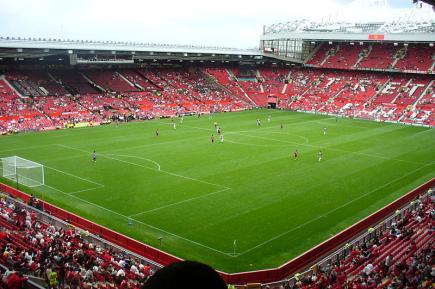Sunday afternoons are usually sombre affairs, unless two of the country’s fiercest rivalling cities face off as they are this weekend when Manchester United and Liverpool cross swords.
The two most successful clubs in England are set to do battle once more, in what is widely recognised as the biggest rivalry in English club football.
No love will be lost between the age-old rivals, where offensive chants and occasional violence mar many of these titanic battles.
The deep-rooted rivalry extends far beyond football however, which is perhaps why it’s stronger than other neighbouring clubs.
The origin of this particular rivalry lies opposite the venue for Sunday’s game, Old Trafford, in the form of the Salford Quays which form part of the Manchester Ship Canal.
Both cities competitive spirit are still as strong as ever and league position never effects the magnitude of this game, as it’s all about which city will get the bragging rights each season.
This season support your favourite team in a new jersey which you can find on Amazon and get some discount by using one of these Amazon deals.
And if you’re looking for bragging rights, this is an inter-city rivalry like no other seen in Britain.
Football aside, below MM take a look at some of the other areas in which the two cities fight tooth and nail with each other.
Economy and Industry:
From where it all began back in the late 1800s, where the building of the Manchester Ship Canal changed the face of the North West economy.
Before, Liverpool was the economic capital of the North West due to its international port which created many jobs in the city.
But the ship canal allowed ships to bypass Liverpool’s ports and go directly to the cottonopolis of Manchester, leading a large amount of job losses in Liverpool.
This led to a lot of hatred from the people of Liverpool towards Manchester at the turn of the century.
In the 70s and 80s both cities suffered economic decline and shared the pain of mass unemployment leading to a slight mutual respect against a Thatcher government.
Recent years though have seen big regenerations projects across the two cities and both now compete to see who can attract the most overseas tourists.
According to Visit Britain’s 2012 statistics, Manchester comes out on top attracting 932,000 visitors compared to Liverpool’s 550,000.
Music:
One area where Mancunians and Liverpudlians compete just as fiercely is on the music scene.
Both cities have produced some of Britain’s most well-known and biggest selling musicians from the Beatles to the Stone Roses.
This has created great debates between the two cities about which city can be called the music capital of the North.
Liverpool dominated the music scene in the 1960s producing artists such as Cilla Black, Frankie Vaughn, Gerry and the Pacemakers and of course the band which produced the soundtrack for the sixties, The Beatles.
However, Manchester’s music scene dominated the eighties and the nineties as bands such as The Stone Roses, Happy Mondays, Joy Division and Oasis came onto the scene.
In recent years both cities haven’t produced many mainstream artists though both have thriving underground music scenes.
Plus with both cities boasting two great music arenas in the shape of the Echo in Liverpool and the Phones4U arena in Manchester they can still attract some of the world’s biggest musicians.
Comedy:
Liverpool and Manchester have produced some of the country’s best comedians down the years as well as some of the country’s best sitcoms.
Manchester has produced comedians and comedy actors such as Steve Coogan, Jason Manford and Caroline Aherne while Liverpool has a rich comedic history thanks to performers such as Jimmy Tarbuck, Ken Dodd, Ricky Tomlinson and more recently John Bishop.
One sitcom which saw the coming together of both cities best comedic talent is the Royle Family.
The nineties smash hit set in Manchester saw two Liverpudlian parents portrayed by Ricky Tomlinson and Sue Johnston deal with their post-teenage Mancunian children played by Ralf Little and Caroline Aherne.
While united on the sitcom scene the stand-up scene sees the best of the ‘banter’ between the two cities.
In recent years the best examples have come from John Bishop and Jason Manford who both make plenty of references to the divide between the two cities.
Topics ranging from accents to fashion are brought up which prove popular in their home cities but can be risky when they perform in each other’s back yards.
Football:
The football pitch is still where the rivalry between the two cities is most recognised around the world.
It’s not just United and Liverpool though who represent the two cities as Manchester City and Everton compete for regional pride.
United and Liverpool dominate English club football’s trophy haul though as they sit first and second respectively as England’s most successful clubs.
United have currently won 66 major trophies while Liverpool are only five behind but both clubs are streets ahead of third place Arsenal who currently have 46 major honours to their name.
Both clubs’ pre-war history is mixed, with both gaining their fair share of success but also suffering relegations as both strived for consistency.
However, United began to dominate in the mid-fifties under Sir Matt Busby’s great team, based around youth which was tragically cut short through the Munich Air Disaster in 1958.

OLD TRAFFORD: The battleground for lots of wars in years gone by (image courtesy of Anthony Parkes, with thanks)
Both clubs then began to compete for the first division title in the mid-sixties between 1963 and 1967 as the trophy alternated between the two clubs.
The seventies and eighties saw a period of Liverpool dominance both in Europe and domestically which was where resentment from United fans began to grow, as they were resigned to being an inconsistent Cup team.
The nineties and the new millennium saw the rejuvenation of United under Sir Alex Ferguson as Liverpool began a decline after the departure of Kenny Dalglish.
United began to eclipse Liverpool’s achievements of the seventies and eighties and in 2011 they went past Liverpool’s record of 18 top flight league titles.
However, Liverpool still holds the bragging rights in Europe as they have five Champions League trophies to United’s three, a source of annoyance for Red Devils fans.
This rivalry though is still as strong as ever and league position never effects the magnitude of this game, as it’s all about which city will get the bragging rights each season.
Main image courtesy of Ticket2ootball via YouTube, with thanks.



